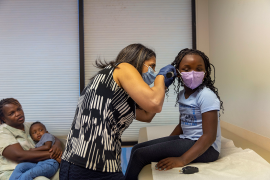By John Reichard, CQ HealthBeat Editor
January 9, 2013 -- Americans die sooner and have higher rates of disease and injury than citizens of many other high-income countries, a new Institute of Medicine (IOM) report says.
The authors also warned that the findings suggest that the U.S. health system, already the most costly in the world, is on track to becoming even more expensive.
"The fact that we have a generation of children who are in worse health than children elsewhere means that tomorrow's adults will be bringing more demands on the health care system," said Steven H. Woolf, chair of the IOM panel that wrote the report. "That will take a system that's already unaffordable and make it even more costly."
While the report lacked specific recommendations for lawmakers, Woolf emphasized that Congress needs to be aware that the findings will affect the nation's economic performance. That's not only because of rising health costs but because poorer health points to a less productive work force, he said.
"Often politicians can be found boasting about us having a ... health system that is the best in the world, and we do have a lot of strengths in our health care system that we can be proud of," Woolf said. "But it's important for our policy-makers to have knowledge of the scope of this problem."
Woolf is a professor of family medicine at Virginia Commonwealth University in Richmond.
The study said that compared to 16 peer nations, the U.S. is at or near the bottom in nine major areas of health: infant mortality and low birth weight; injuries and homicides; teenage pregnancies and sexually transmitted infections; prevalence of HIV and AIDS; drug-related deaths; obesity and diabetes; heart disease; chronic lung disease; and disability.
The U.S. outperformed its peers in some areas: Americans over age 75 live longer; Americans have lower death rates from stroke and cancer; they have better control of cholesterol and blood pressure levels; and they have lower rates of smoking.
Broad Range of Problems
The institute billed the study as the first comprehensive look at multiple diseases, injuries, and behaviors across the entire life span, comparing the U.S. with peer nations.
"I personally was stunned by what the disadvantage was across so many topic areas," Woolf said. This suggests "something fundamentally is going wrong."
The report said Americans are more likely to engage in certain unhealthy behaviors. These include heavy intake of calories and behaviors that increase the risk of fatal injuries. Also, it said that the U.S. has relatively high poverty rates. And it has higher rates of income equality and lags behind other nations in educating young people.
But "the problem is not simply a matter of a large uninsured population or even of social and economic disadvantage," the report said. "It cannot be explained away by the racial and ethnic diversity of the U.S. population. The report shows that even relatively well-off Americans who do not smoke and are not overweight may experience inferior health in comparison with their counterparts in other wealthy countries."
During a telephone news briefing, the report's authors were asked to explain why foreign leaders fly to the U.S. for health care when they become seriously ill yet the report shows Americans at a health disadvantage.
"Health is determined by much more than health care," replied Woolf. "Our health as Americans is only partly aided by having a very good health system." He added that "it might be true that the Mayo Clinic and the other systems where the VIPs of the world go for health care offer excellent care, but the average American is not necessarily getting care in that setting."


